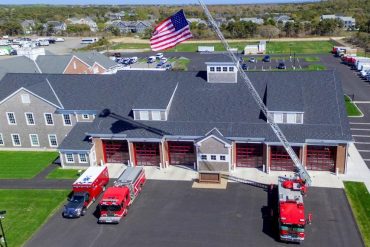When the National Weather Service issued a tornado warning for Nantucket on Nov. 12, many islanders’ cell phones buzzed with an automated message, warning them to seek shelter. But the town of Nantucket’s early warning system – a series of outdoor sirens around the island – remained silent.
 In the aftermath, some island residents questioned why the sirens – installed back in 2014 at a cost of $50,000 – did not provide an alert regarding the tornado warning.
In the aftermath, some island residents questioned why the sirens – installed back in 2014 at a cost of $50,000 – did not provide an alert regarding the tornado warning.
Nantucket Police Chief Bill Pittman, who advocated for the sirens seven years ago, explained to the Select Board earlier this week that it was due in part to a technology upgrade by the National Weather Service that allows it to predict when conditions are ripe for a tornado, prompting the warning that was sent out last month. The current policy for Nantucket’s sirens, however, is that they would only kick on if there was an actual tornado spotted, Pittman said. In light of what happened last month, that policy is now under review.
“The reason is pretty simple,” Pittman told the Select Board. “The National Weather Service issues tornado warnings in three situations. One is if there is an actual tornado on the ground or a water spout approaching land from the water. The other situation is if a funnel cloud is actually spotted and they’ll issue a warning. The third situation, and this is what occurred in this case, and I have to go back a little bit – in the last year the National Weather Service upgraded their technology and moved their services from Taunton to another community and increased their technology available for forecasting weather. They now can get almost three-dimensional image of clouds and storm systems on their radars. As part of that they can identify the clouds they are strongly associated with tornadic activity and in this case that’s what they observed. Our policy that we developed in 2014 called for the sirens to be activated if there was a tornado warning issued based on the fact that one was spotted or a funnel cloud was spotted. In this case, the rotation of the clouds was a new phenomenon for us and our policy hasn’t gotten up to speed with that and we’re really struggling with how to do that. This type of forecast is going to be a very quick forecast which is what happened that night. It was issued and by the time we got notified it was being cancelled. So we’re looking at our policy to see if that’s something we can transition to, that third condition, or if expanding the number of people who can order the sirens to be sounded would accomplish what would need to happen.”
Currently only Pittman and Lieutenant Brendan Coakley can activate the alarm system. Pittman is deciding whether to expand that group to include Fire Chief Steve Murphy, Deputy Police Chief Charles Gibson, and others.
“We’ve got to remember the alert sirens were designed to notified people who are outdoors, typically on beaches or in open areas, upon the approach of a life threatening situation,” Pittman said. “If we designed it for indoor use, we would need another half dozen of them around the island. The reason for that was the traditional methods , the wireless alert system that many of you got on your phones, it doesn’t reach everyone.”
Pittman was one of those people who for whatever reason did not receive an alert on his mobile phone.
“Sirens provide a last ditch, ultimate notice for people who have no other way to know something bad is happening and they need to seek shelter,” he said. “It did reveal that we really need to update our policy, but that being said I don’t know we would have done anything different than what had occurred that night.”






